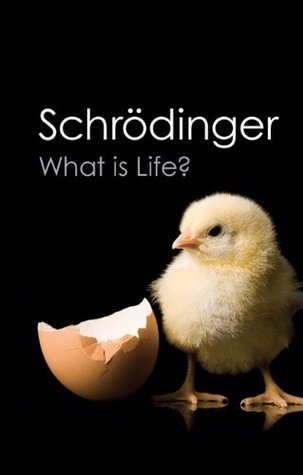More on this book
Community
Kindle Notes & Highlights
If you fill an oblong quartz tube with oxygen gas and put it into a magnetic field, you find that the gas is magnetized.5 The magnetization is due to the fact that the oxygen molecules are little magnets and tend to orientate themselves parallel to the field, like a compass needle. But you must not think that they actually all turn parallel. For if you double the field, you get double the magnetization in your oxygen body, and that proportionality goes on to extremely high field strengths, the magnetization increasing at the rate of the field you apply.
the laws of physics, as we know them, are statistical laws.2 They have a lot to do with the natural tendency of things to go over into disorder.
What then is that precious something contained in our food which keeps us from death? That is easily answered. Every process, event, happening – call it what you will; in a word, everything that is going on in Nature means an increase of the entropy of the part of the world where it is going on. Thus a living organism continually increases its entropy – or, as you may say, produces positive entropy – and thus tends to approach the dangerous state of maximum entropy, which is death. It can only keep aloof from it, i.e. alive, by continually drawing from its environment negative entropy – which
...more
And look at the way they are actually distributed. Every cell harbours just one of them (or two, if we bear in mind diploidy). Since we know the power this tiny central office has in the isolated cell, do they not resemble stations of local government dispersed through the body, communicating with each other with great ease, thanks to the code that is common to all of them?
As zero temperature is approached the molecular disorder ceases to have any bearing on physical events. This fact was, by the way, not discovered by theory, but by carefully investigating chemical reactions over a wide range of temperatures and extrapolating the results to zero temperature – which cannot actually be reached. This is Walther Nernst’s famous ‘Heat Theorem’, which is sometimes, and not unduly, given the proud name of the ‘Third Law of Thermodynamics’ (the first being the energy principle, the second the entropy principle).
Men and women for whom this world was lit in an unusually bright light of awareness, and who by life and word have, more than others, formed and transformed that work of art which we call humanity, testify by speech and writing or even by their very lives that more than others have they been torn by the pangs of inner discord. Let this be a consolation to him who also suffers from it. Without it nothing enduring has ever been begotten.
However, its next stage, national egoism or briefly nationalism, is still in full swing with them. A worker bee that goes astray to the wrong hive is murdered without hesitation.
Beside the point, but for kept bees, foreign bees are actually welcomed into the hive if they carry a lot of nectar. At least I know this to be true for the Buckfast bees.
If we were bees, ants or Lacedaemonian warriors, to whom personal fear does not exist and cowardice is the most shameful thing in the world, warring would go on for ever. But luckily we are only men – and cowards.
Unhappily Lamarckism is untenable. The fundamental assumption on which it rests, namely, that acquired properties can be inherited, is wrong. To the best of our knowledge they cannot.
The entire discussion on Darwinian evolution vs Lamarckism is extremely interesting when read in the light of recent studies on epigenetic inheritance. It may yet yield some credence to Lamarckism after all.
Next to want, boredom has become the worst scourge in our lives. Instead of letting the ingenious machinery we have invented produce an increasing amount of superfluous luxury, we must plan to develop it so that it takes off human beings all the unintelligent, mechanical, ‘machine-like’ handling. The machine must take over the toil for which man is too good, not man the work for which the machine is too expensive, as comes to pass quite often.
Very fitting, as it was since the industrial revolution and even today, with all the machine learning algorithms and worry about robots taking our jobs (they won't, and the jobs they do take are probably for the better anyway).


